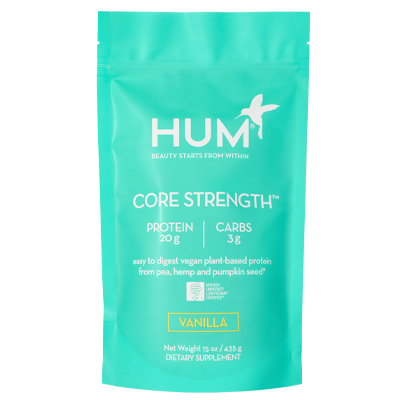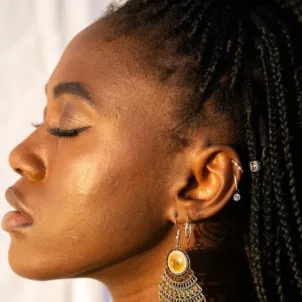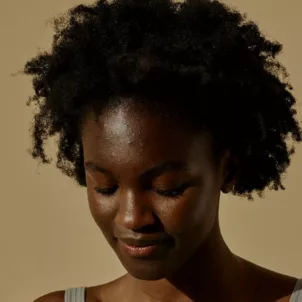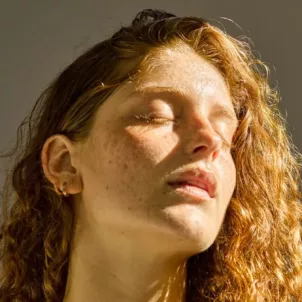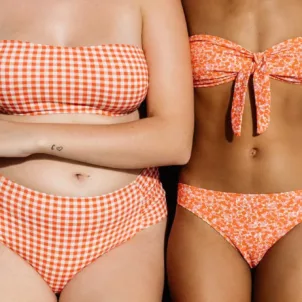What causes acne? While some things are more commonly known to be linked to breakouts (think: dairy), others are not as obvious. Two board-certified dermatologists break down eight surprising habits that can cause acne.
As someone who has struggled with acne for years, I know how hard it can be to clear up breakouts. Not only do pimples vary in type (blind pimples versus cystic acne versus whiteheads), but they also have varying causes. Adult acne, for example, can be triggered by hormonal changes while more traditional breakouts have been linked to dairy consumption, among other food sensitivities.
So, what causes acne? The formation of acne is caused by four different things: excess sebum (or oil) production, clogged hair follicles, acne-causing bacteria, and inflammation of the skin. But how you get to those stages is a little more complicated. While you may know things like touching your face, sleeping with makeup on, and hormonal changes are common causes of acne, there are other surprising habits that can cause breakouts. Everything from the skincare products you use, the food you eat, and the stress levels you experience can cause pesky pimples. We talked to board-certified dermatologists to find out what they are.
8 Causes of Acne You Didn’t Know About
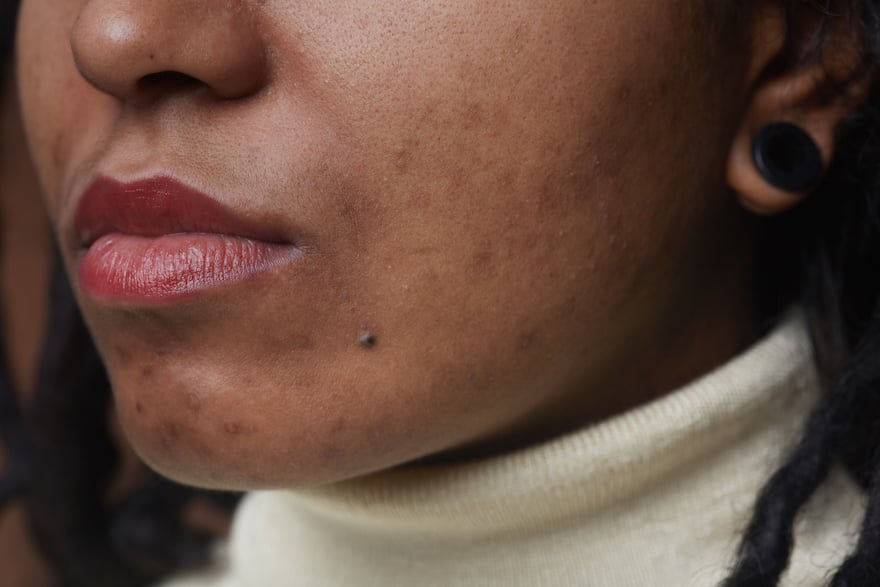
Skincare Products
While you may think your 12-step lineup of products is promoting clear skin, it can actually do the opposite. Face oils and other pore-clogging skincare products (such as oil-based night creams, coconut oil, and heavy face masks) can actually cause breakouts—especially if you’re acne-prone, says Caren Campbell, MD, FAAD, a board-certified dermatologist with practices in San Francisco and Napa Valley.
Additionally, too many harsh products (think: ones made with intense active skincare ingredients) can disrupt or damage the skin barrier (the outermost layer of your skin), which can make you more susceptible to breakouts, redness, and irritation.
The Fix: Edit your skincare routine to the basics: a gentle face wash, a non-comedogenic (i.e. won’t clog your pores) moisturizer, a broad-spectrum mineral-based sunscreen, a retinol, and a vitamin C serum. Don’t know which ones to buy? Consult a board-certified dermatologist to find out which products would suit your skin the best.
Sugary Foods
“Increased sugar in the gut can feed gut bacteria and increase gut inflammation, which in turn, can increase blood and skin inflammation,” says Dr. Purvisha Patel, MD, FAAD, a board-certified dermatologist in Tennessee and founder of Visha Skincare. So, does sugar really cause acne? Dr. Campbell says it should be noted that while there is a correlation between acne and high-glycemic foods in studies, it’s not statistically significant. However, it’s best to eat sugary foods in moderation, according to the Centers for Disease Control.
But one myth we’re happy to bust—does chocolate cause acne? Not necessarily. “Eating refined sugars can increase acne, not necessarily chocolate,” Dr. Patel says.
The Fix: Take a look at potential sources of sugar in your diet. Keep in mind that sugar can be hidden in unexpected places like dressings and sauces, bread, yogurt, granola, and beverages. Swap highly-processed, sugary foods with whole foods instead. If you’re looking for inspo, check out our recipe pages for RD-approved ideas like these homemade dark chocolate almond butter cups.
Birth Control
Can birth control cause acne? Since hormone fluctuations can increase sebum and oil production around ovulation, it’s common to experience an increase in acne while on birth control. “Typically, oral contraceptive pills with estrogen and progesterone are helpful for acne, as they lower androgen hormones in the blood that drive oil production in the skin and drive acne,” Dr. Campbell says. “Progesterone-only oral contraceptive pills are not helpful and can cause acne along with other types of birth control—implantable birth control can worsen and cause acne.”
The Fix: If your acne is persistent, Dr. Patel recommends talking to your OB-GYN about switching birth control or using topicals (such as retinol) to help treat your breakouts.
Sweat
You’ve likely heard that it’s common to experience post-workout breakouts. But does sweat cause acne? Unfortunately, yes. “Sweating causes follicular occlusion (or clogged pores), leading to an increase in acne,” Dr. Patel says. “Microbes on the skin can grow in warm moist environments, so sweat can cause an increase in acne.”
Sweating with makeup on your face can increase irritation and the risk of developing breakouts too.
The Fix: If you’re working out, Dr. Campbell says it’s best to wash your face, chest, and back pre- and post-workout. “If you struggle with acne or folliculitis, it’s best to wash after working out with a benzoyl peroxide wash in the shower.”
Certain Protein Powders
Not all protein powders are created equal. There are two main types: whey protein powder (made with animal-based protein) and plant-based protein powder. If you’re wondering if whey protein powder causes acne, the answer is yes. Since whey protein is a type of dairy, it can increase androgen hormones and worsen acne, Dr. Campbell says. “I always ensure my acne patients are not taking whey or creatine supplements.”
The Fix: Swap your whey protein powder with a plant-based alternative such as HUM Nutrition’s Core Strength, which is made with pea protein.
Perfume or Cologne
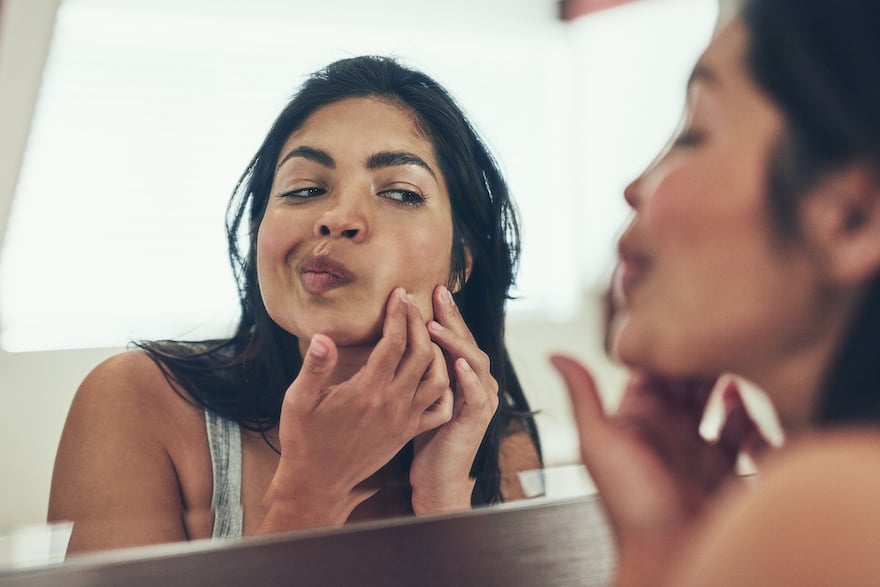
Does cologne or perfume cause acne? Yes, because most colognes and perfumes use fragrance oils to give the product their signature scent, says Dr. Patel. Those oils can clog your pores and cause breakouts on your face, chest, and back. However, it’s more likely you’ll experience a fragrance allergy rash or irritation rash (which can resemble acne for some).
The Fix: Spray your perfume onto your clothing or into your hair instead of directly onto your skin to avoid any unnecessary irritation.
Biotin
You may have heard that biotin causes acne, but is it true? “Some people do report an increase in acne due to increased oil production,” says Dr. Patel. However, there isn’t much scientific evidence to support a direct link between biotin supplements and acne.
The Fix: Speak to your doctor if you’re experiencing breakouts upon taking biotin supplements. And, as always, make sure the supplements you’re taking are using clean, responsibly-sourced ingredients. HUM Nutrition’s Hair Sweet Hair is Clean Label Project-Certified and contains a blend of biotin and other nutrients to encourage hair growth.
Dirty Sheets
Time to air out the dirty laundry: Your sheets could be behind your breakouts. More specifically, dirty pillowcases can cause breakouts on your face. When you sleep, sweat, dirt, product buildup, and dead skin cells can all accumulate on your pillowcase. If you don’t wash it regularly, all of this can clog your pores and cause pimples. Same goes for your PJs if you’re prone to body acne.
The Fix: To help keep breakouts at bay, try washing your pillowcase at least once a week (per the National Sleep Foundation). However, if you’re especially acne-prone, you may want to switch out your pillowcase every three days.
